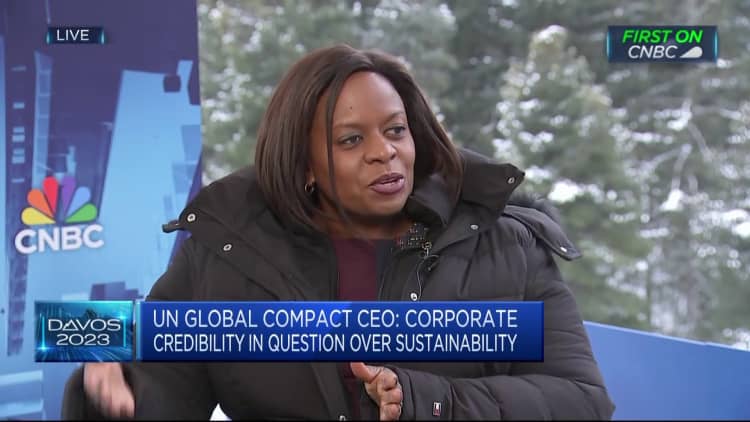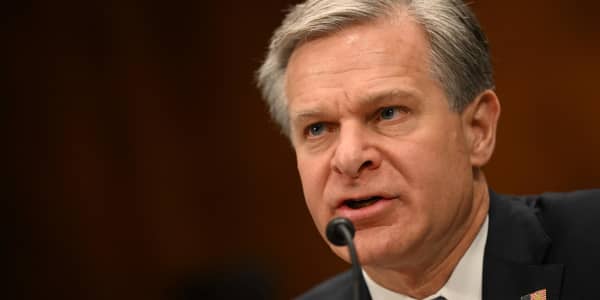The political debate around corporate focus on environmental, social and governance issues is nowhere near over, but more C-suites and corporate boards are putting their own money where there mouth is when it comes to the the importance of these strategies. Companies are increasingly linking ESG metrics to executive compensation packages.
Nearly half of the Russell 1000 (43%) discloses that it uses ESG-related key performance indicators in executive compensation metrics, according to data from Just Capital, a nonprofit that measures corporate stakeholder performance. That percentage of Russell 1000 companies linking ESG goals to compensation has quickly grown in recent years, from 14% in 2020 to 18% in 2021 to 28% in 2022.
"There's an increasing recognition from boards and executives that assessing CEO performance should include profit and a more holistic, long-term set of non-financial but material indicators. Issues like human capital, environmental risk, and governance issues are connected to the health and competitiveness of the firm – and that's what we're seeing emerge in compensation packages," Just Capital chief strategy officer Alison Omens wrote in an email.
There's also been a steady push from investors focused on these issues, none more prominent than BlackRock CEO Larry Fink. While Fink, under more pressure than ever as the anti-ESG political movement has targeted him, wrote in his annual letter to investors earlier this year that it's "not for companies, including asset managers, to be the environmental police," these issues are clearly viewed as material.
He added, "Investing for the long term requires taking a long-term view of what will impact returns, including demographics, government policy, technological advancements, and the transition to a low-carbon economy," Fink wrote. "For years now, we have viewed climate risk as an investment risk. That's still the case."
Up to 15% of annual bonus pay at stake
While the environment is the most well-known ESG issue, companies are focusing on metrics that cover the breadth of ESG, with the S (for social issues including workers and communities) often appearing in the form of diversity goals or health and safety indicators, according to Just Capital corporate research analyst Molly Stutzman. Companies also often include metrics that Stutzman said would be labeled "ESG or ESG modifiers," which suggests they are thinking about ESG performance holistically and not solely in environmental terms, she said.
Chipotle has tied ESG goals to executive compensation since 2021, a measure that chief corporate affairs Officer Laurie Schalow said has helped not only make it "very clear" what the company's priorities are but also helped the leadership team make "decisions that aligned with meeting those objectives."
The goals, which this year can increase or decrease executives' overall bonus payout by up to 15%, are centered around three areas that Chipotle has identified as important to meet its sustainability goals: food and animals, people, and the environment. For Chipotle executives to meet these goals, the company needs to purchase at least 37.5 million pounds of local produce, improve its diverse employee retention, and increase the number of restaurants with composting programs.
To date, Chipotle has reached all of the ESG-related compensation-linked goals it has set for executives, Schalow said, which have previously included upping the supply of local produce, increasing the diversity of its internal pipeline for promotions, and reducing its Scope 1 and 2 greenhouse gas emissions.
Few quantifiable details on success
While there has been an uptick in the number of companies that disclose use of ESG goals in determining executive bonuses, it is often unclear what triggers the accomplishment of the goal.
Where companies describe that progress on an ESG-related goal has led to an increase in bonus for an executive, "rarely is the goal described to the level of detail that someone outside the company would be able to interpret what specific progress occurred," Stutzman said. "Often in executive compensation plans, an executive's performance is reviewed for the year and they are rewarded for achieving a sustainability milestone but it is not always clear if that goal was expressed from the outset or if the achievement is just being used to justify their bonus after the fact," she said.
Chipotle has received feedback from investors asking for its goals to be more quantitative than in the past, and also takes into consideration its own sustainability report and the progress it's making as a company when it looks to set the goals each year, Schalow said.
While the three goals that Chipotle ties to compensation do not encompass all of the sustainability-focused goals the company sets out to achieve each year, Schalow said it helps the company and its executives attack areas "we didn't want to lose sight of," part of the reason it shifted towards composting and waste this year.
More employee pay at all levels being targeted
Chipotle, for now, is keeping its ESG-related bonuses strictly to its executive officer team, but there has been a growing trend of companies linking ESG goals to pay at lower levels of the organization.
In 2021, Mastercard changed its executive compensation model for its most senior executives, EVPs and above, to link their bonus structure to goals set around carbon neutrality, financial inclusion and gender pay parity. Then Mastercard announced last April that all of its employees would have their bonus calculations determined by how the company did on its ESG goals, specifically around emissions, financial inclusion and the gender pay gap.
While the company didn't quantify these goals in public, it said it "met or exceeded" them. A Mastercard spokesman declined to provide comment beyond the company's previous announcements.
Papa John's took a similar step last year, introducing an ESG bonus incentive for eligible employees and executives for goals around enhancing diversity, equity and inclusion, environmental impact, and its broader mission around cleaner and better ingredients. Those workers are generally full-time corporate members above the restaurant level.
Madeline Chadwick, chief corporate affairs officer at Papa John's, said the company wanted to build on the ESG strategy it had put together and further galvanize workers towards it.
"If you really want to motivate people to execute and help with these things that you think are important, what better way than to tie their compensation to it," Chadwick said. "If you really want to drive all of these initiatives and prioritize them, this was a really good way to do it."
Chadwick said that while the goal was to get all of Papa John's employees to rally around its goals, the company was also cognizant of tying goals to employees that "didn't have a lot of input over."
Papa John's has not disclosed what its specific compensation-linked ESG-goals are, but Chadwick said the company looked to "pick a couple of priorities" that are "really tied to our business and really critical for moving our business forward in some way."
This approach doesn't cover the many franchise-employed workers that represent Papa John's to most consumers, but she said it is on the executive team and other leaders to set the best practices for the entire brand.
"While we may not control, for example, the benefits and compensation of franchise team members, there are things in ESG that we can impact that benefit everyone," she said. "This is part of our business strategy, and all of our efforts are tied to how we drive business results and do the right thing for our company."
Ensuring that stakeholder or purpose strategies aren't simply a C-suite initiative, but an effort that extends from the front-line to middle managers to senior executives, may help drive the connection to ESG goals for employees, Omens said, but it puts further emphasis on senior leaders to "support those strategies through training and integration efforts into existing operational functions. Otherwise, it's simply not setting people and the company up for the kinds of successes that those bonuses are presumably trying to solve for," she said.
Chipotle did discuss last year extending the ESG bonus goal to the director level of the company, but Schalow said there was a bit of pushback centered on the concern that some of those employees would not be able to have a material impact on the goal. "For example, if there is an ESG goal around emissions, does a director of finance have any direct oversight or responsibility for how that is achieved?" Schalow said. But she added that the company may still look to change the approach in the future.






